

Grammar contrasts 1: used to and would. By Tim Bowen An article by Tim Bowen explaining the difference between 'used to' and 'would' when talking about the past.
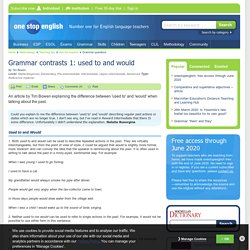
Could you explain to me the difference between 'used to' and 'would' describing regular past actions or states which are no longer true. I don't see any, but I've read in Reward Intermediate that there IS some difference. Unfortunately I didn't understand the explanation.
Used To & Would - 6 Minute Grammar. Used To—How To Use It and Common Mistakes. Don’t feel bad if you mix up use to and used to now and again—it is not an uncommon mistake.
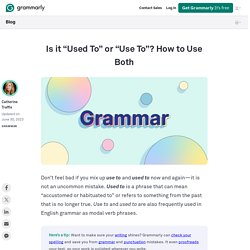
Used to is a phrase that can mean “accustomed or habituated to” or refers to something from the past that is no longer true. Use to and used to are also frequently used in English grammar as modal verb phrases. Used To Exercise 2. 'Used To' Download this explanation about 'used to' in PDF. 'Used to + infinitive': We use this expression to talk about habits or repeated actions in the past which we don't do in the present.
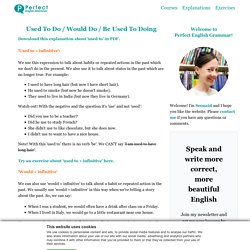
We also use it to talk about states in the past which are no longer true.
Past habits without 'used to': Stop Saying. Modals to express habits: WILL, WOULD, USED TO. Present Would can express annoying habits which are typical of a person: Tom would do something like that, wouldn't he?
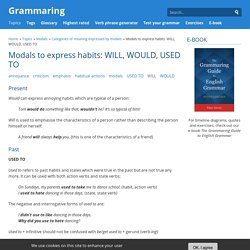
It's so typical of him! Will is used to emphasise the characteristics of a person rather than describing the person himself or herself: A friend will always help you. The good old days: used to and would. I was born in 1936 and I lived with my family in a village near Bristol.

My father was a fruit farm advisor and my mother was a housewife. But when our teacher retired from my school, my mother asked for the school books and started a small school at home. Exercise 1 - used to and would. Would vs. Used To. Observant writers and grammarians see words as more than letters and syllables that help to form an idea.
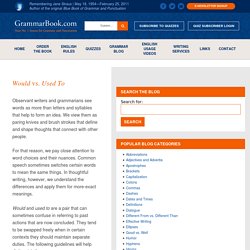
We view them as paring knives and brush strokes that define and shape thoughts that connect with other people. For that reason, we pay close attention to word choices and their nuances. Common speech sometimes switches certain words to mean the same things. In thoughtful writing, however, we understand the differences and apply them for more-exact meanings. The Flatmates - Language Point 69. The difference between USED TO and WOULD. Used to and would are both use to describe something that happened regularly in the past but doesn't happen any longer, as shown in the following two sentences about quitting smoking: I used to smoke, but I quit last year.
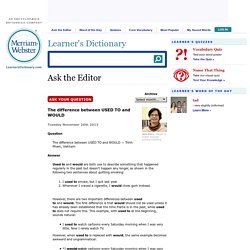
Whenever I craved a cigarette, I would chew gum instead. Advanced Grammar.
BBC Learning English - Course: lower intermediate / Unit 17 / Session 2 / Activity 1. BBC Learning English - Course: lower intermediate / Unit 17 / Session 2 / Activity 2. BBC World Service - Learning English. BBC Learning English - Course: intermediate / Unit 23 / Grammar Reference. BBC World Service. BBC World Service. Learning English. Would, Used To Or Simple Past. English language quiz - would - typical behaviour - 02. We ______________ live in the countryside. used to would Both are possibleI __________ have long hair. used to would Both are possible.My dad _____________ tell us stories about his childhood. would used to Both are possible.There ________________ be TV programmes during the day. didn't used to wouldn't didn't use toI ____________ wear glasses. didn't used to didn't use to wouldn'tI ______________ be lazy at school. used to would Both are possible_________________ have a lot of friends at school?
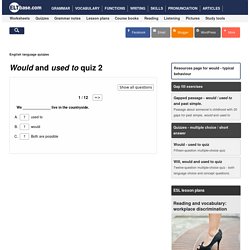
Did you used to Did you use to Would youI __________ sweets as a child. would like used to like Both are possible.We _____________ have a computer at home. wouldn't didn't used to didn't use toWe _____________ have two cats and a dog. would used to Both are possible.On rainy days, I ______________ read books or comics. would used to Both are possible.We _________________ play football every evening after school. used to would Both are possible. English language quiz - would - typical behaviour - 01. When I was a child we _______________ in London. would live used to live both are possibleI __________ a cat called Tommy. would have used to have both are possibleI ______________ to wear glasses. used to would both are possibleI ____________ hate English lessons!
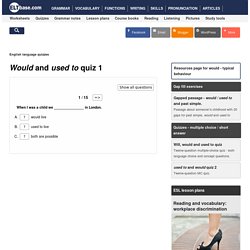
Would used to both are possibleI _____________ fall asleep or draw pictures in my exercise book. would used to both are possibleAfter school we _____________ play in the park. would used to both are possibleI __________________ like football then - but I like it now. wouldn't didn't used to didn't use toAt weekends we __________________ go fishing in a lake near my house. would used to both are possible______________ get into trouble with your teachers when you were at school?
Did you used to Did you use toThe phrase 'used to' has __________ syllables two threeThe pronunciation of 'used to' and 'use to' (questions and negatives) is the same true FalseYou can use 'used to' to talk about... Used To - English Lesson. The Flatmates - Language Point 69. The Flatmates - Language Point 38. ‘used to + infinitive’ and ‘be/get used to’
‘used to + infinitive’ and ‘be/get used to’ People often get confused about the use of used to + infinitive and be/get used to + ‘ing’ form because they look similar.
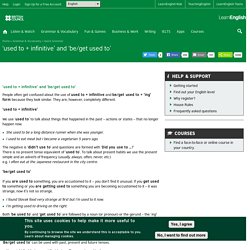
They are, however, completely different. ‘used to + infinitive’ We use ‘used to’ to talk about things that happened in the past – actions or states – that no longer happen now. Past habit – used to/would/past simple. BBC Learning English - Course: intermediate / Unit 23 / Session 2 / Activity 1. BBC Learning English - Course: intermediate / Unit 23 / Grammar Reference. Used to. I used to work hard/I’m used to working hard (Phrases with ‘used to’)
By Kate Woodford On this blog, we like to look at words and phrases in the English language that learners often have difficulty with. Two phrases that can be confused are ‘used to do something’ and ‘be used to something/doing something’. People often use one phrase when they mean the other, or they use the wrong form of the verb that comes after one of these phrases. This is not at all surprising. Although these ‘used to’ phrases have different meanings, they both refer to things that are often done or experienced. The good old days: used to and would. Getting used to new things: get used to. BBC Learning English - Course: lower intermediate / Unit 17. BBC Learning English - Course: intermediate / Unit 23 / Session 2 / Activity 1. Learning English. BBC World Service - Learning English. Learning English. Used to.
‘used to + infinitive’ and ‘be/get used to’ Used to - English Grammar Today - Cambridge Dictionary. We use used to when we refer to things in the past which are no longer true. It can refer to repeated actions or to a state or situation: He used to play football for the local team, but he’s too old now. That white house over there used to belong to my family.
(It belonged to my family in the past, but not any more.) BBC Learning English - Course: The Grammar Gameshow / Unit 1 / Session 4 / Activity 1.